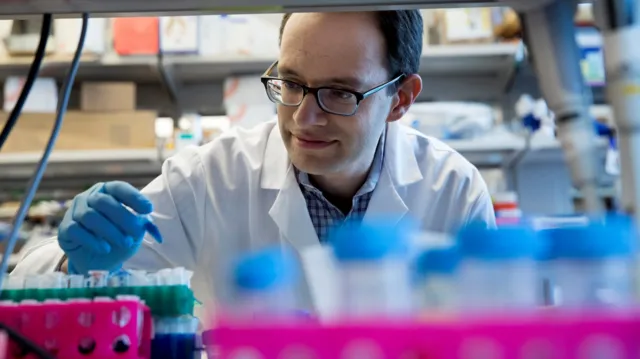Artificial Intelligence (AI) is poised to revolutionize medical diagnostics by enhancing the ability to detect diseases like ovarian cancer at earlier stages through advanced blood tests. This transformation comes as part of an ongoing trend in medical research, where AI-driven technologies are providing faster and more accurate results, potentially saving countless lives.
Ovarian cancer, often described as “rare, underfunded, and deadly,” remains a significant challenge, according to Audra Moran, head of the Ovarian Cancer Research Alliance (OCRA).
Early detection is critical because by the time the cancer reaches the ovaries, it may have already spread. Studies suggest that detecting ovarian cancer up to five years before symptoms appear could significantly reduce mortality rates.
Researchers like Dr. Daniel Heller, a biomedical engineer at Memorial Sloan Kettering Cancer Center, are developing cutting-edge AI-driven blood tests that can spot signs of ovarian cancer at its earliest stages.
Dr. Heller’s team utilizes carbon nanotubes — microscopic tubes about 50,000 times smaller than a human hair — that emit different wavelengths of light when substances in the blood bind to them. These nanotube sensors, combined with AI, are capable of recognizing subtle patterns in the data that would be impossible for humans to detect.
The AI algorithm is trained by feeding it data from blood samples of patients with ovarian cancer, other cancers, and related gynecological diseases.
Even with limited datasets due to ovarian cancer’s rarity, early trials have shown that the AI system can achieve higher accuracy than current biomarkers.
Although this technology is still in development, it holds promise for significantly improving diagnostic tools within the next three to five years.
In addition to early cancer detection, AI is being deployed to accelerate the diagnosis of potentially life-threatening infections like pneumonia. Pneumonia can be deadly for cancer patients, and traditional testing involves conducting numerous costly procedures to identify the exact pathogen.
California-based company Karius has developed an AI-powered blood test that can pinpoint the specific pathogen causing pneumonia within 24 hours. By comparing patient samples to a vast database of microbial DNA containing billions of data points, Karius simplifies diagnosis and helps doctors quickly prescribe the correct antibiotics.
This approach not only speeds up treatment but also reduces healthcare costs, which can otherwise exceed $20,000 in a single week of hospital testing.

AI is also finding success in detecting a wide range of diseases through complex biomarker patterns. Dr. Slavé Petrovski, a researcher at AstraZeneca, has developed an AI platform called Milton, which can accurately identify 120 diseases by analyzing biomarkers in the UK Biobank dataset. Milton boasts a success rate exceeding 90%, underscoring AI’s potential to uncover intricate patterns that human researchers might miss.
Despite the progress, a significant obstacle remains: access to data. Many hospitals still silo their patient data, limiting the ability of researchers to train AI algorithms effectively. Organizations like OCRA are addressing this issue by creating large-scale patient registries where individuals can consent to share their medical records for AI research.
“We are still in the wild west of AI,” says Audra Moran, reflecting on the ongoing challenges and opportunities within this field. As data-sharing practices evolve and AI models improve, these innovative blood tests could redefine how diseases are detected and treated, potentially ushering in a new era of personalized medicine.
The integration of AI in diagnostics is not just a future concept; it is a tangible development that is transforming healthcare today. With continued investment, collaboration, and data sharing, AI-powered blood tests could become an essential tool for detecting diseases early, saving lives, and reducing healthcare costs globally.


